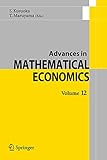Advances in Mathematical Economics / edited by S. Kusuoka, T. Maruyama.
Tipo de material: TextoSeries Advance in Mathematical Economics ; 12Editor: Tokyo : Springer Japan, 2009Descripción: v, 170 páginas recurso en líneaTipo de contenido:
TextoSeries Advance in Mathematical Economics ; 12Editor: Tokyo : Springer Japan, 2009Descripción: v, 170 páginas recurso en líneaTipo de contenido: - texto
- computadora
- recurso en línea
- 9784431929352
- HB1-846.8
Springer eBooks
Unemployment and income distribution in the medium-run growth model -- Convergences in a dual space with applications to Fatou lemma -- Variational analysis and mathematical economics 1: Subdifferential calculus and the second theorem of welfare economics -- Smooth feasible solutions to a dual Monge–Kantorovich problem with applications to best approximation and utility theory in mathematical economics -- Optimal growth rate in random trade time -- Some properties of distortion risk measures.
Advances in Mathematical Economics is a publication of the Research Center for Mathematical Economics, which was founded in 1997 as an international scientific association that aims to promote research activities in mathematical economics. Our publication was launched to realize our long-term goal of bringing together those mathematicians who are seriously interested in obtaining new challenging stimuli from economic theories and those economists who are seeking effective mathematical tools for their research. The scope of Advances in Mathematical Economics includes, but is not limited to, the following fields: - economic theories in various fields based on rigorous mathematical reasoning; - mathematical methods (e.g., analysis, algebra, geometry, probability) motivated by economic theories; - mathematical results of potential relevance to economic theory; - historical study of mathematical economics. Authors are asked to develop their original results as fully as possible and also to give a clear-cut expository overview of the problem under discussion. Consequently, we will also invite articles which might be considered too long for publication in journals.
Para consulta fuera de la UANL se requiere clave de acceso remoto.


